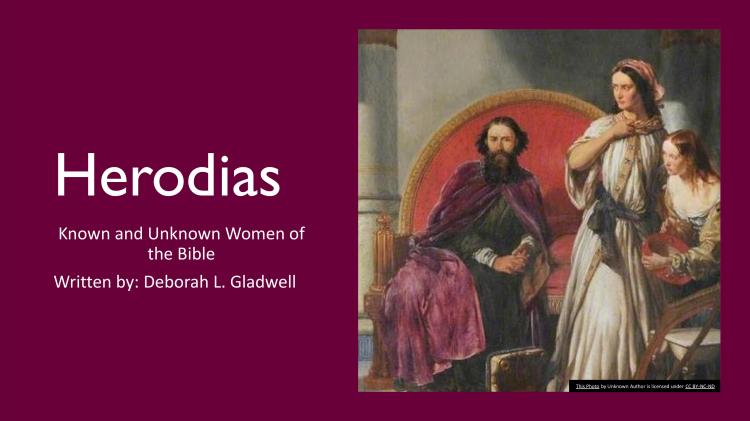
Herodias was a beautiful woman that used her beauty to acquire whatever she wanted in life. She was married to Herod Philip. Philip was the son of, Herod the Great by Cleopatra of Jerusalem. Herodias divorced Philip and married his half-brother Herod Antipas, the son of Herod the Great by his wife Malthace. Her father Aristobulus was the older half-brother of both Philip and Antipas. He was the son of Herod the Great and Mariamne. It was common in them days to marry within the family. If you notice Herodias’s father and both her husbands were all half brothers.
Herodias had two brothers, Herod of Chalcis and Herod Agrippa 1. She birthed a daughter named Salome by her first husband, Herod Philip.
As I stated earlier Herod Philip was Herodias’s first husband and Herod Antipas was her second husband. John the Baptist pointed out to Herod Antipas and Herodias that their marriage was not legal.
“For Herod himself had sent forth and laid hold upon John, and bound him in prison for Herodias’ sake, his brother Philip’s wife: for he had married her. 18 For John had said unto Herod, It is not lawful for thee to have thy brother’s wife.” Mark 6:17-18
Was it illegal for Herodias and Herod Antipas to marry? Can divorced people not remarry? Yes, divorce people can remarry, the sin here is that Herod Antipas married his brother’s wife.
“Thou shalt not uncover the nakedness of thy brother’s wife: it is thy brother’s nakedness.” Leviticus 18:16
From the moment John told them their marriage was illegal, Herodias, felt furious anger toward John and wanted him dead. But Herod was afraid to do so because John was a holy man.
“Therefore Herodias had a quarrel against him, and would have killed him; but she could not: 20 For Herod feared John, knowing that he was a just man and an holy, and observed him; and when he heard him, he did many things, and heard him gladly.” Mark 6:19-20
Herodias was a very devious woman and on her husband’s birthday, she had her daughter Salome dance for him. It is unknown if this dance was a belly dance, striptease, or the dance of seven veils. It does not matter which because the king was smitten by her dance. He promised her anything she wanted would be given to her up to half of his kingdom.
“And when a convenient day was come, that Herod on his birthday made a supper to his lords, high captains, and chief estates of Galilee; 22 And when the daughter of the said Herodias came in, and danced, and pleased Herod and them that sat with him, the king said unto the damsel, Ask of me whatsoever thou wilt, and I will give it thee. 23 And he sware unto her, Whatsoever thou shalt ask of me, I will give it thee, unto the half of my kingdom.” Mark 6:21-23
Salome sought advice from her mother as to what to do. Herodias plot had worked and she gleefully had her daughter ask for John’s head. I guess the saying, “Hell has no fury like a woman’s scorn”, is a very fitting description for Herodias.
“And she went forth, and said unto her mother, What shall I ask? And she said, The head of John the Baptist. 25 And she came in straightway with haste unto the king, and asked, saying, I will that thou give me by and by in a charger the head of John the Baptist. 26 And the king was exceeding sorry; yet for his oath’s sake, and for their sakes which sat with him, he would not reject her. 27 And immediately the king sent an executioner, and commanded his head to be brought: and he went and beheaded him in the prison, 28 And brought his head in a charger, and gave it to the damsel: and the damsel gave it to her mother.” Mark 6:24-28
Although Herodias was a deceitful vengeful woman she loved her husband and was faithful to him until the end. Herod was eventually betrayed by her brother Agrippa I and banished. Herodias is said to have followed him instead of claiming her property as she could have done.
1“Herod Antipas, with Herodias his incestuous mistress, was banished first to Gaul, and afterwards to Ilerda in Spain. Herodias dancing upon the river Sicoris when it was frozen, fell through the ice, and perished miserably.”
https://amazon.com/author/dgladwell
Reference
1Cornelius À Lapide. The Great Commentary. chapter 6. v. 28.